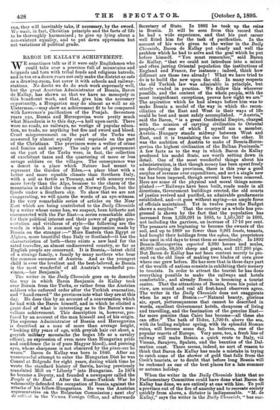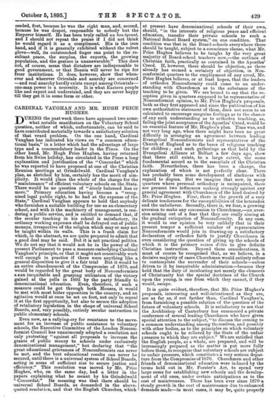BARON DE KALLAY'S ACHIEVEMENT.
WE sometimes talk as if it were only Englishmen who could take over a province full of mountains and brigands and torn with tribal feuds and religious hatreds, and in ten or a dozen years not only make the district as safe as a drawing-room, but cover it with schools and railway- stations. No doubt we do do such work supremely well, but the great Austrian Administrator of Bosnia, Baron de Kallay, has shown us that we have no monopoly in this b2neficent work, and that, give him the necessary opportunity, a Hungarian may do almost as well as an Ulsterman,—may show an achievement fit to be compared with Lawrence's pacification of the Punjab. Seventeen years ago, Bosnia and Herzegovina were pretty much what Macedonia is to this day,—a hell upon earth. There were no roads, no railways, no vestige of popular educa- tion, no trade, no anything but fire and sword and blood. Cruel misgovernment on the part of the Turks was answered by almost equally cruel reprisals on the part of the Christians. The provinces were a welter of crime and famine and misery. The only acts of government on the part of the Turks were, in fact, the collection of exorbitant taxes and the quartering of more or less savage soldiers on the villages. The consequence was a desert in a place which Nature had meant to represent the Garden of Eden,—a place blest with a better and more equable climate than Southern Italy, with a soil as fertile as Tuscany, and with scenery even more lovely than the Alps, because to the charm of the mountains is added the charm of Norway fjords, but the fjords under a Southern sky. To show that we are not exaggerating, we will quote the words of an eye-witness. In the very remarkable series of articles on the Near East which are being contributed to the Daily Chronicle by a writer whose name has, we suspect, been hitherto not unconnected with the Far East—a series remarkable alike fc.r their political interest and their power of graphic pre- sentation and vividness of style—the following are the words in which is summed up the impression made by Bosnia on the stranger :—" More Eastern than Egypt or Algiers, more beautiful than Italy or Scotland—it has the characteristics of both—there exists a new land for the sated traveller, an almost undiscovered country, so far as English people are concerned. It is Bosnia,—latest child of a strange family, a family by many mothers who bear the common surname of Austria. And as the youngest child is ever the loveliest and the best-beloved, so Bosnia is the most wonderful of all Austria's wonderful pro- vinces,—her Benjamin."
The writer in the Daily Chronicle goes on to describe the way in which Baron Benjamin de Kallay took over Bosnia from the Turks, or rather from the Austrian soldiers who enforced order after the Turkish evacuation, and " hand-reared " the provinces into what they are at this day. He does this by an account of a conversation which he had with the Baron himself, and in which he elicited a great deal of what is interesting as to the Baron's mar- vellous achievement. This description is, however, pre- faced by an account of the man himself and of his origin. The supreme Administrator of Bosnia and Herzegovina is described as a man of more than average height, "looking fifty years of age, with greyish hair cut short, a greyish military moustache (he began life as a cavalry officer), an expression of even more than Hungarian pride and confidence (he is of pure Magyar blood), and piercing eyes, whose sharpness is not obscured by the pince-nez he wears." Baron de Kallay was born in 1840. After an unsuccessful attempt to enter the Hungarian Diet he was Consul at Belgrade for eight years, during which time he wrote the standard history of Servia, having previously translated Mill on " Liberty " into Hungarian. In 1874 he became a Deputy, and founded a newspaper called the People of the East. After the Russo-Turkish War he vehemently defended the occupation of Bosnia against the attacks of his fellow-Hungarians. He was the Austrian representative on the Bulgarian Commission ; next chef de cohr, et in the Vienna Foreign Office, and afterwards Secretary of State. In 1882 he took up the reins in Bosnia. It will be seen from this record that he had a wide experience, and that his past career well fitted him for the task of pacification. In the account of his work given to the writer in the Daily Chronicle, Baron de Kallay put clearly and well the problem which he had to solve and the goal which he put before himself. "You must remember," said Baron de Kallay, "that we could not introduce into a mixed and often jarring Oriental population the institutions of England and France, for instance ; indeed, think how different are these two already ! What we have tried to do is to build the new upon the old. In many respects the old Turkish law was admirable in principle, but utterly evaded in practice. We follow this wherever possible, and the content of the whole people, with the most insignificant exceptions, proves how right we are." The aspiration which he had always before him was to make Bosnia a model of the way in which the recon- ciliation of the East and West in their ways of life could be best and most safely accomplished. "Austria," said the Baron, "is a great Occidental Empire, charged with the mission of carrying civilisation to Oriental peoples,—of one of which I myself am a member. Austria - Hungary stands midway between West and East, and it is translating the one for the other. It was the ambition of Austria to make of Bosnia-Herze- govina the highest civilisation of the Balkan Peninsula." A few facts as to the way in which Baron de Kallay produced his model State, are worth setting down in detail. One of the most wonderful things about his administration, is that though money has been spent freely on developing the provinces, there is this year a good surplus of revenue over expenditure, and not a single new tax has been imposed, though several have been removed. Here are some of the physical and moral things accom- plished :—" Railways have been built, roads made in all directions, Government buildings erected, the old courts of justice revived and purified, an admirable gendarmerie established, and—it goes without saying—an ample force of officials maintained. Yet in twelve years the Budget shows a surplus." That the country as a whole has pro- gressed is shown by the fact that the population has increased from 1,336,091 in 1885, to 1,56,5,357 in 1895, not including the garrison, an increase of 17.16 per cent. The peasants are beginning to become the owners of the soil, and up to 1889 no fewer than 9,991 kinds, tenants, had bought their holdings from the aghas, the proprietors who used in old days to treat them so mercilessly. In 1892 Bosnia-Herzegovina. exported 2,980 horses and mules, 48,990 cattle, 88,500 sheep and goats, and 217,260 pigs. But Baron de Kallay has not been content merely to pro- ceed on the old lines of making two blades of corn grow where one grew before. He has seen that in these days part of the wealth of nations consists in exhibiting their scenery to tourists. In order to attract the tourist he has done everything possible to make the railways and hotels comfortable, and already Bosnia is becoming a tourist centre. That the attractions of Bosnia, from his point of view, are sound and real all first-hand observers agree. The writer in the Daily Chronicle does not exaggerate when he says of Bosnia :—" Natural beauty, glorious air, sport, picturesqueness that cannot be described in words, excellent Government hotels, cheapness of living and travelling, and the fascination of the genuine East— far more genuine than Cairo has become—all these she can offer." The bath of Ilidze, 1,700 ft. above the sea, with its boiling sulphur spring, with its splendid Roman ruins, will become some day, he believes, one of the popular resorts of Europe. Very soon, too, a fresh line of railway will make Bosnia a quick route to Italy, NG. Vienna, Sarajevo, Spalato, and the beauties of the Dal- matian coast. There seems, indeed, no sort of reason to think that Baron de Kallay has made a mistake in trying to catch some of the shower of gold that falls from the Cook's tourists, or to doubt that before long Bosnia will be reckoned as one of the best places for a late summer or autumn holiday.
When the writer in the Daily Chronicle hints that no Parliamentary Committee could have done what Baron de Kallay has done, we are entirely at one with him. To pull a province out of the fire of anarchy and to recreate society quickly from above, a dictator is indispensable. "M. de Kallay," says the writer in the Daily Chronicle," has suc- ceeded, first, because he was the right man, and, second, because he was despot, responsible to nobody but the Emperor himself. He has been truly called un bon tyrant, and I should not repeat the praise if I did not think he would regard it as a compliment. His is the iron hand, and if it is generally exhibited without the velvet glove—well, its outstretched finger can point to the re- sultant peace, the surplus, the exports, the growing population, and the gesture is unanswerable." This does not, of course, mean that dictators are indispensable to good government, or that Bosnia will never be ripe for freer institutions. It does, however, show that when- ever and wherever Orientals and anarchy are concerned —and real anarchy hardly exists except among Orientals— one-man power is a necessity. It is what Eastern people like and expect and understand, and they are never happy till they get it in some form or other.







































 Previous page
Previous page